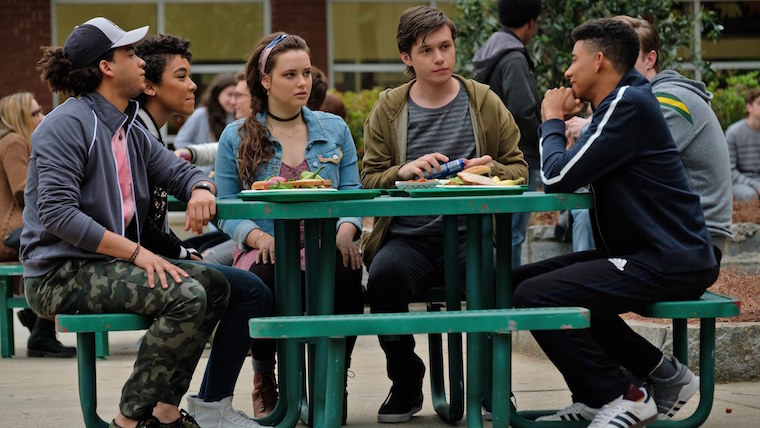A bit of an antidote to the exquisite pathos of ‘Call Me by Your Name’, the gay-teen-rom-dramedy ‘Love, Simon’ is just what the world needs now. Skip and I saw it the other night and were more impressed than either of us expected to be. (Here come a couple of semi-spoilers, so caution should be taken by those who like to watch their movies completely untainted.)
The movie concerns the coming-out process and romantic overtures of title character Simon, a typical teenager who lives in a stylishly-atypical house of suburban perfection. (I mean, this kid gets a bedroom with a balcony.) He is eventually outed by someone, and his anger at one point is directed mostly at the fact that he was robbed of getting to do it in his own way and time. This is an interesting twist, and a testament to the progress we have made over the last decade or two.
In my teenage years, most of us didn’t see coming out as something we wanted to do. It wasn’t a rite of passage that was glorified or revered, and it certainly wasn’t something that we viewed as an honor that belonged only to us. At least I don’t remember it as such. To see a character, whether intended or not, who has enough pride and sense to know that a gay person’s coming-out is indeed a badge of honor is refreshing. To see him come into his own and claim that must be an empowering scene for someone struggling with their own journey.

My only half-issue with the movie (as it was in ‘Call Me By Your Name’) was the utter perfection of how the parents behaved. True, there was a slight pause in how they completely accepted the pronouncement, perhaps a couple of days of awkwardly not addressing the issue, but then they fell into the current cinematic formula of being absolutely and unconditionally loving.
That’s not how it always goes, not in my experience anyway, and not in the experience of many kids, even today. Perhaps it’s because I’m one of the older gays now, and my coming out was in a pre-internet world where there wasn’t support to be found on a phone or a computer. Some of us never got that instant and unconditional acceptance and love when we finally risked coming out to our parents. It’s not always a day or two before parents come around and tearfully embrace their gay kids – sometimes it takes months, years even, and in that time the hesitation and coldness that results, coming from the two people who are supposed to love you no matter what, can be devastating and debilitating for someone who is already terrified of how the rest of the world will react.
Maybe, I hope, it’s different for most kids today. I pray that it is. But that reality is not as common or prominent as it needs to be. So to that end, I suppose the perfect parents in ‘Love, Simon’ serve a purpose – an aspirational model of how to be better, for all of us to strive to achieve.


